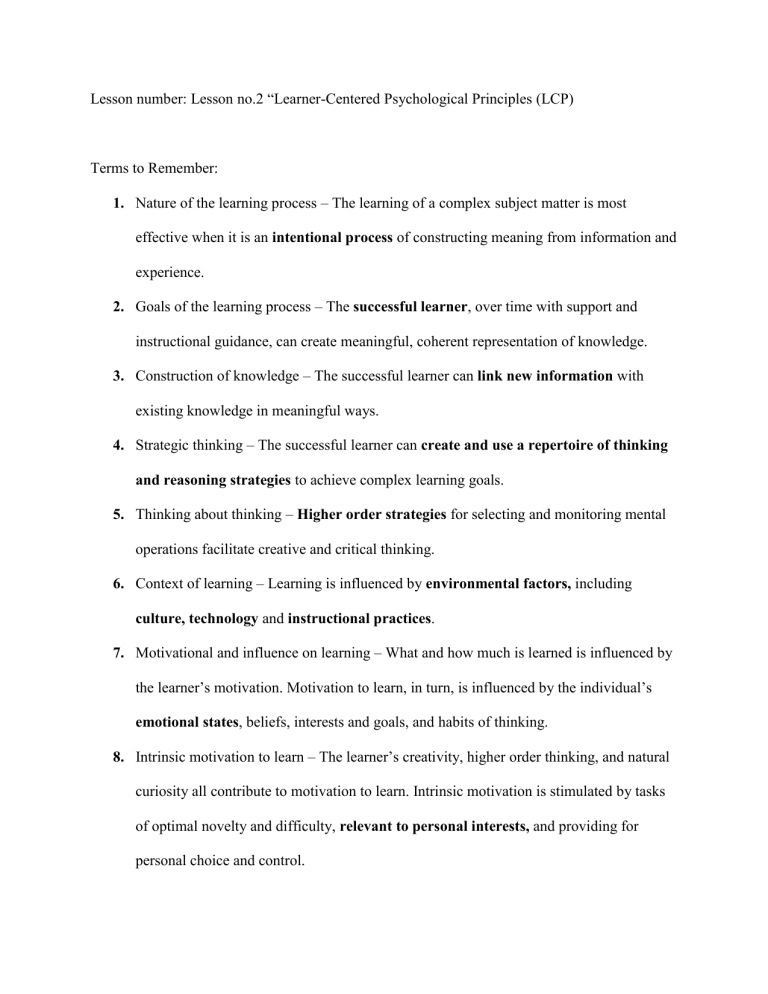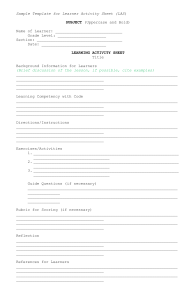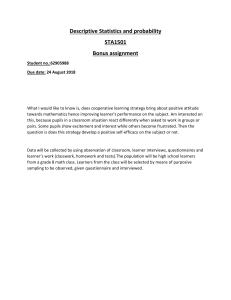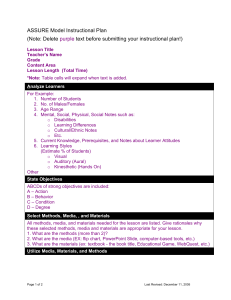
Lesson number: Lesson no.2 “Learner-Centered Psychological Principles (LCP) Terms to Remember: 1. Nature of the learning process – The learning of a complex subject matter is most effective when it is an intentional process of constructing meaning from information and experience. 2. Goals of the learning process – The successful learner, over time with support and instructional guidance, can create meaningful, coherent representation of knowledge. 3. Construction of knowledge – The successful learner can link new information with existing knowledge in meaningful ways. 4. Strategic thinking – The successful learner can create and use a repertoire of thinking and reasoning strategies to achieve complex learning goals. 5. Thinking about thinking – Higher order strategies for selecting and monitoring mental operations facilitate creative and critical thinking. 6. Context of learning – Learning is influenced by environmental factors, including culture, technology and instructional practices. 7. Motivational and influence on learning – What and how much is learned is influenced by the learner’s motivation. Motivation to learn, in turn, is influenced by the individual’s emotional states, beliefs, interests and goals, and habits of thinking. 8. Intrinsic motivation to learn – The learner’s creativity, higher order thinking, and natural curiosity all contribute to motivation to learn. Intrinsic motivation is stimulated by tasks of optimal novelty and difficulty, relevant to personal interests, and providing for personal choice and control. 9. Effects of motivation on effort – Acquisition of complex knowledge and skills requires extended learner effort and guided practice. Without learners' motivation to learn, the willingness to exert this effort is unlikely without coercion. 10. Developmental influences on learning – As Individuals develop, there are different opportunities and constraints for learning. Learning is most effective when differential development within and across physical, intellectual, emotional, and social domains is taken into account. 11. Social Influences on learning – Learning is influenced by social interactions, interpersonal relations and communication with others. 12. Individual differences in learning – Learners have different strategies, approaches and capabilities for learning that are a function of prior experience and heredity. 13. Learning and diversity – Learning is most effective when differences in learners' linguistics, cultural and social backgrounds are taken into account. 14. Standard and assessment – Setting appropriately high and challenging standard and assessing the learner as well as learning progress – including diagnostic process and outcome assessment- are integral parts of the learning process. Application of the Lesson: A. The 14 principles are intended to apply to us as a learner. B. Not only students but to children, teachers, administrators, parents, and comunities. Significance of the Lesson as a teacher: The significance of the lesson as a teacher are intended to deal holistically with learners in the context of real-world learning situations.


